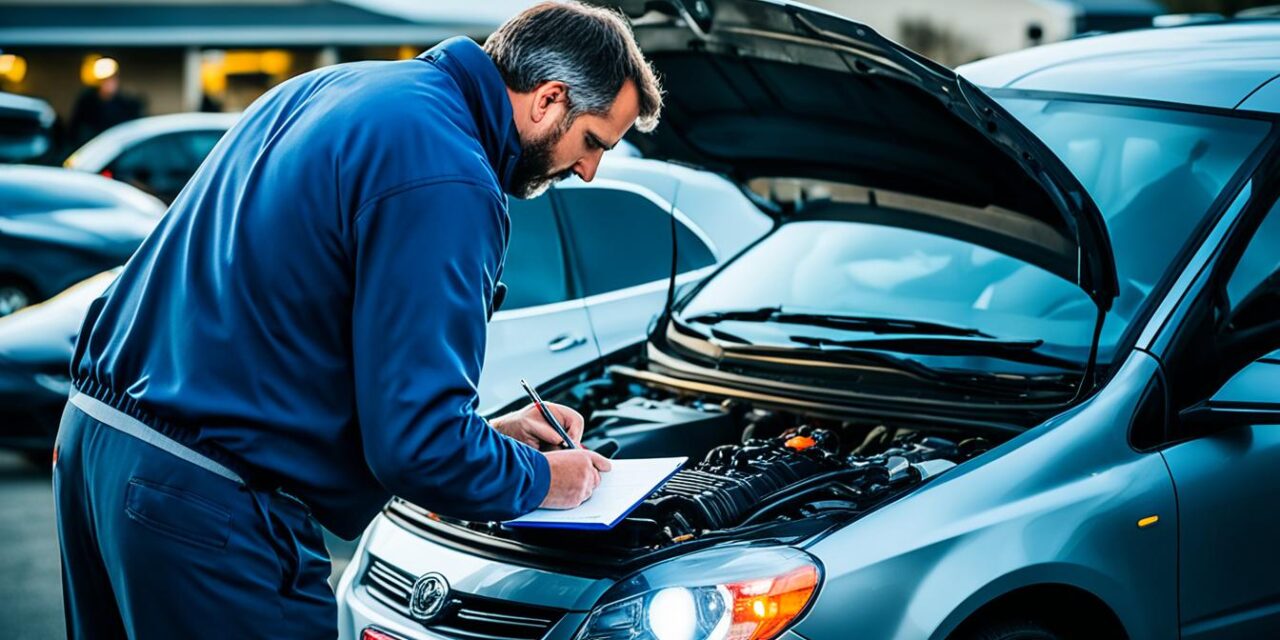Buying a used car can be exciting and a bit scary. It’s a big step that needs careful thought and research. But don’t worry! With some smart tips, you can find the right car for you and your budget.
Now, used-car prices are lower than they were in 2022 and 2023. The average price in early February 2024 was $25,328. This is a great chance for smart buyers to get good deals on reliable cars. But, be careful and do your homework to avoid problems and get a car that will last.
We’ll help you with the steps to buy a used car. We’ll talk about setting a budget, finding reliable models, getting financing, and checking the car before you buy. With these tips, you’ll be ready to make a smart choice and find the perfect car for you. So, get ready for an exciting journey to your new car!
Key Takeaways
- Set a realistic budget and stick to it, factoring in insurance, fuel, and maintenance costs
- Research reliable car models and consider certified pre-owned vehicles for added peace of mind
- Secure financing before shopping to know your spending limits and avoid dealership pressure
- Thoroughly inspect the vehicle, checking its history report and having a mechanic perform an inspection
- Test drive the car in various conditions and look for signs of water damage or previous accidents
Set a Budget and Stick to It
Buying a used car means setting a realistic budget and sticking to it. Experts say spend no more than 20% of your take-home pay on a car. This includes loan payments, insurance, fuel, and maintenance.
Look at your monthly budget to see how much you can spend on a car loan. Aim to spend 10-15% of your net pay on it. Use an auto loan calculator to see what you can afford. Remember, add costs like maintenance, fuel, insurance, and repairs to your budget too.
Determine How Much You Can Afford
Think about your annual income and how much you can spend on a car. If you make $60,000 a year, you might spend up to $15,000 on a car. This is 25% of your income. But, your budget can change based on your life and what you value.
Factor in Insurance, Fuel, and Maintenance Costs
Don’t forget about the costs of owning a car. Insurance prices change based on your driving record and the car you pick. Look for insurance quotes to make a smart choice.
Think about how much fuel your car will use. This affects your monthly fuel costs. Also, save money for maintenance and repairs to avoid surprises. By planning well, you can make sure your car fits your budget and needs.
Research Reliable Models
When looking for a used car, pick safe and reliable models that fit your budget and needs. Start by making a list of your top five car choices. Use reviews and safety ratings from trusted sources like the Insurance Institute for Highway Safety and Kelley Blue Book. These sites offer great info on the reliability and value of different used cars.
Check Safety Ratings and Reviews
Always think about safety when picking a used car. Look at safety ratings from the NHTSA and IIHS to see how safe the cars are. Check for airbags, electronic stability control, and crash test scores. This helps you choose a car that keeps you safe on the road.
Consumer Reports says some used cars are more reliable than others of the same year. This makes them a good choice for smart buyers.
Read user reviews and expert opinions to understand each model’s good and bad points. Look for common issues to help you decide.
Consider Certified Pre-Owned Vehicles
Think about certified pre-owned (CPO) cars if you’re buying from a dealership. These cars are young, have low miles, and have a clean history. They go through strict checks and often come with a long warranty from the maker.
CPO cars are usually more reliable and satisfying than regular used cars but cost more. But, the detailed check, longer warranty, and knowing the car is well-kept might be worth it for many people.
If you find a great used car not in a CPO program, you can buy a private extended warranty. Make sure to look at the warranty’s details. Coverage and deductibles can be very different.
By focusing on safe and reliable models, checking safety ratings and reviews, and looking at certified pre-owned options, you’ll find the perfect used car. It will meet your needs and last for years.
Secure Financing Before Shopping
Before you go to a dealership, look into your financing options and get an auto loan preapproval. This way, you can negotiate a good interest rate and terms. Credit unions, online lenders, and banks offer different financing, with rates from 4.99% to 34.9% based on your credit.
Getting preapproval for a car loan shows you know about your credit and can get better rates. Many lenders check your credit without hurting it, and some offer preapproval after a detailed check. A car loan calculator lets you compare loans and pick the best one for your budget.
Being preapproved means you’re ready to negotiate when you go to the dealership. Salespeople see you as more ready and serious. This makes negotiating easier and gives you an edge, as dealers will try to offer you good rates.
“Working with a bank to discuss financing before heading to the dealership may potentially save more money by allowing buyers to compare interest rates. Bank financing can save time at the dealership as the financing process can be lengthy.” – Auto Finance Expert
Dealer financing might seem easy, but be careful. Dealers might suggest a lender that pays them more, not you the best rate. Getting financing before you go saves you from extra costs and gets you the best deal. Make sure you’re ready by checking your credit, saving for a down payment, and knowing your budget before applying for an auto loan.
Thoroughly Inspect the Vehicle
Before you buy a used car, make sure to check it out well. Get a vehicle history report with the car’s VIN from trusted places like Carfax or AutoCheck. This report tells you about the car’s past, like accidents, flood damage, and how many owners it had.
Have a Mechanic Perform an Inspection
Have a certified mechanic check the car out. They can spot problems that aren’t easy to see, like bad brake pads, engine troubles, or suspension issues. If they find big problems, you can talk to the seller about fixing them or lowering the price.
Test Drive the Car in Various Conditions
Try driving the car in different places. Listen for strange sounds and see if it pulls to one side or brakes weird. Drive on city streets and highways to see how it does overall. If the car has custom parts, make sure they don’t make it less safe or useful.
Look for Signs of Water Damage or Previous Accidents
Check the car for signs of water damage or past accidents. Look for bad smells, stained carpets, or rust under the car. Also, check for paint that doesn’t match, big gaps in the panels, or paint overspray. These could mean the car was in an accident before. Make sure to check for safety recalls for the car’s make and model on the National Highway Traffic Safety Administration’s website. Make sure any recalls are fixed before you buy.



Recent Comments